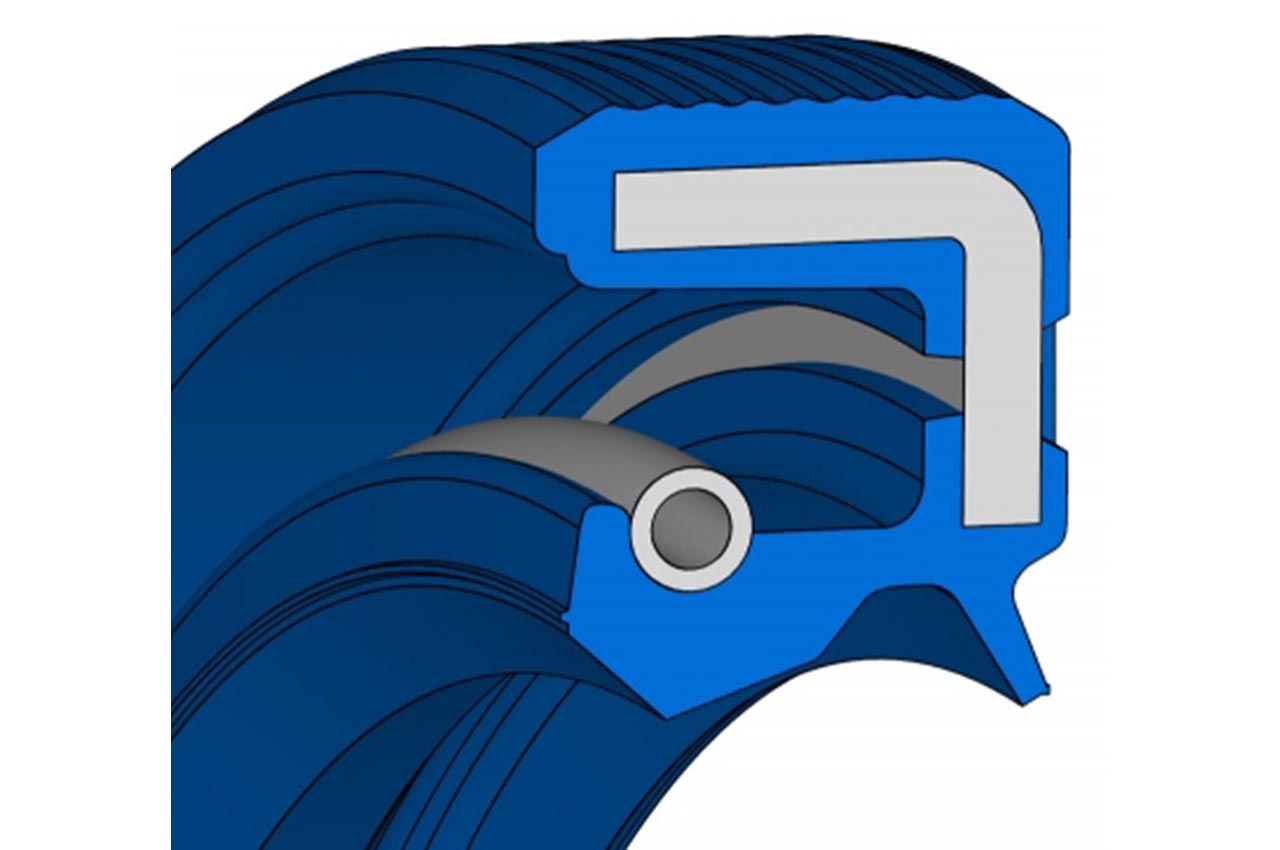
The Varvel Group serves international customers as a reliable partner in the supply of gearboxes for low to medium power applications. Varvel is committed to achieving the highest standards of quality in all areas, starting from the selection of its suppliers. That is why Varvel chooses Freudenberg oil seals. Freudenberg is a German company that serves various areas of the mechanical engineering industry and produces a wide range of oil seals for different applications.
Oil seals play an essential role in any gearbox. They are used to seal rotating shafts to prevent oil leaks and protect the system against external contamination. Oil seals basically consist of three elements: A metal insert gives the seal its shape. The rubber material enables the sealing functionality, typically the elastomer outer diameter that provides a static sealing effect for housing bores and the main sealing lip that provides a dynamic sealing on the rotating shaft and is in direct contact with lubricant in the gearbox. A garter spring supports the main sealing lip to ensure the radial force on the shaft.
For applications to counter dust and dirt exposure oil seals are available with a protective lip in contact with the shaft surface. When the gearbox is functioning, the pumping action of the gears ensures effective lubrication and lubricant exchange in the gear meshing area. Damage or wear to the main oil seal can lead to oil leaks and consequent contamination.
There are many reasons for oil leaks in general use and in most of the cases the root cause is not a defective seal. Despite this, users perceive oil seals as the weak point of the gearbox, and the failure of this component is particularly damaging to the image of the gearbox manufacturer.
On top of this common perception, in recent years machine manufacturers have begun placing greater emphasis on the performance of power transmission systems. More dynamic action, higher power density, higher pressures, harsher work cycles with more frequent starts and stops, new lubricants that are more ecological but also more aggressive to oil seals, smaller diameter seals and extended warranties: all these factors make the choice of the right oil seal increasingly important if performance is to be guaranteed and customers kept satisfied. Until the early years of the new millennium, gearboxes in industry were generally used for only one shift per day (giving around 2000 hours of operation a year). Over the last 15 years, however, usage has increased to two or even three shifts a day, giving 7,000-8,000 hours of operation a year. Gearboxes therefore have to work more in less time, and consequently require more frequent maintenance.
When a gearbox is working, shaft rotation inevitably generates friction between the rubber of the seal and the metal of the shaft, with the amount of friction generated depending on the speed of rotation.
Friction, of course, generates heat, and the higher the pressure between the seal and the shaft, the higher the temperature. For example, in an application with typical working conditions an oil seal on a shaft of 45mm in diameter rotating at a speed of 3,000 rpm could generate a frictional torque of about 0.2 Nm. This absorbs about 65 W of power, equivalent to a specific heat of around 220 W/cm2.
It is hardly surprising, therefore, that sooner or later oil seals wear as a result of normal gearbox use, potentially leading to an oil leak. The market’s demand for higher annual operating hours, of course, means more rapid oil seal wear.
The lifetime prediction of an oil seal is not possible, the reliability depends on the specific working conditions but the expected lifetime of an oil seal depends on the type of elastomer material from which it is made. Varvel uses two main types of compound for gearbox applications: NBR, which enables a lifetime of around 3,000-5,000 hours and FKM, which can give a lifetime of up to 5,000-7,000 hours in the case of standard FKM and up to 20,000 hours in the case of special FKM compounds. For typical working conditions NBR rubber can be used for all applications involving speeds of up to 1,500-2,000 rpm, depending on shaft diameters, and operating temperatures of around 80-100°C. FKM seals are adopted for higher speeds and for temperatures up to 150°C on the sealing area.
To respond to ever more challenging demands for performance while maintaining premium quality, Varvel has chosen to source superior quality oil seals from an internationally acclaimed manufacturer. In recent years, Freudenberg has developed a range of innovative solutions including high performance NBR compounds, new FKM compounds for significantly improved durability and new lip configurations that reduce friction and extend effective seal lifetimes.
The new oil seals selected by Varvel are compatible with applications in the food industry, resist extreme temperatures and can be used with lubricants that are critically aggressive to standard seals. The versatility and functionality of these new Freudenberg seals clearly demonstrate how the Varvel Group is always able to find the best possible solution to any requirement in the field of power transmission.
For more information:
MGM Varvel Power Transmission
+91 44 26533665
URL: www.varvel.in